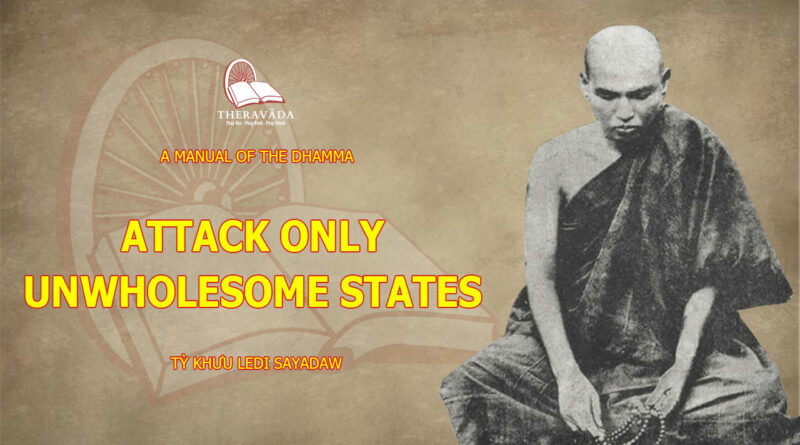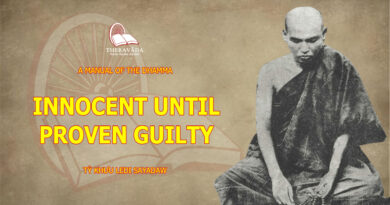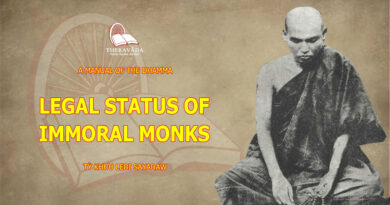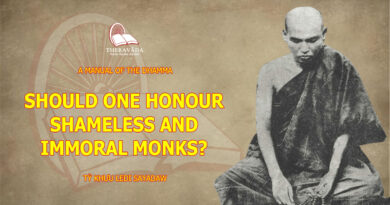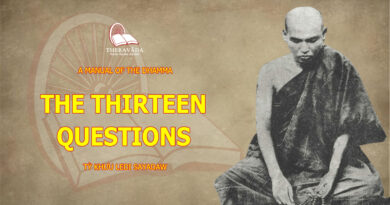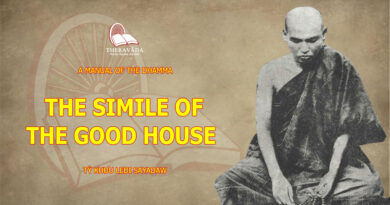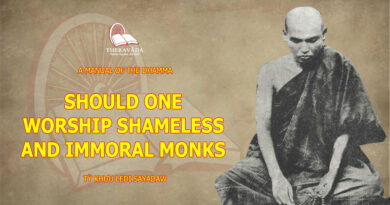Attack Only Unwholesome States
One should blame and criticise unwholesome states as follows: greed is shameful, filthy, wicked, degrading, coarse, and unskilful. Greed causes only trouble and so is shameful. In the next existence it will cause one to suffer in hell. Such criticisms must focus on unwholesome states only. Shamelessness and immorality certainly deserve to be criticised, by all means.
The next method must be applied to oneself in relation to others’ mistakes. Reflection on one’s own mind must be made as follows: “I have thousands of such unwholesome kammic seeds from countless past lives and also in this life. I am not altogether free from shamelessness and immorality. Even if I accumulate wholesome deeds sometimes, if I become self-satisfied, I will have to endure the results of countless past evil deeds, which will certainly produce their effects in the four lower realms. In past lives I have surely done various evils that will bear fruit now or hereafter.” Such reflection on arisen evil is a duty for all.
The next procedure is as follows: “This person has done evil due to the power and influence of greed, hatred, and delusion, and has become shameless or immoral. He is very weak due to these evil forces. Why does anyone commit evil? Because one retains the root of all evil — self-view, which always accompanies evil deeds, shameless deeds, and immoral deeds. It is self-view that gives rise to all these evil things for ordinary persons. So the real culprits are greed, hatred, and delusion, headed by self-view. Such latent evils still exist in me, and will bear fruit sooner or later, so I am in the same boat as shameless, wicked, and immoral persons. If I am satisfied with temporary morality, the tendency towards evil will make me shameless or immoral tomorrow, next week, next month, or in the next life. These evils will affect me again, and I may kill my mother or my father in the future due to self-view. This is the way to reflect on unarisen evil in oneself.
The third correct procedure for consideration is as follows: “Why has this monk, who previously maintained morality, now fallen into immorality? He was self-satisfied as a good monk with temporary morality, and failed to develop it to the stable stage. This was the cause of his moral downfall. Temporary moral achievement is not reliable. This type of morality soon disappears like a firework display. I must strive to achieve stable morality. This is my greatest duty.” Such considerations must be made daily by everyone.
The fourth procedure for consideration is this: “This monk, while moral, rested content with it and failed to practise concentration and insight as taught by the Buddha. So this good, scrupulous monk still accepted self-view, which made him commit evil, great and small. Although he was good before, later he did bad things, becoming immoral. Likewise, if I am satisfied with temporary morality and fail to practise concentration and insight, this pernicious self-view will make me do all sorts of evil in the coming days, months, years, and lives. I will surely become just like this immoral monk. Self-view must be eradicated by wisdom. In these ways one must consider the wholesome states not yet arisen. If these considerations are made, one is partially following the practice of four right efforts.
The evils of being an ordinary person are too numerous to count, so innumerable dangers exist too. Seeing the evils and dangers of an ordinary person, a far-sighted person gets moral dread and a sense of urgency. His mind always inclines towards concentration and insight meditation to overcome moral weaknesses, whenever he sees the faults of others. He uses these facts for self-examination and self-reform, and strives earnestly to eradicate these defects in himself. So everything helps him to obtain earnestness and spurs him to action. This superior way of self-reform through far-sighted trepidation is the way of noble persons like bodhisattas, sages, and all civilized persons. This is the ancient, noble way of self-analysis.
This path to deliverance is excellent. All Bodhisattas, in their final lives, have to see an old man, a sick man, and a dead man as universal signs for all. This gives them a sense of urgency and spurs them to renounce the world. This noble renunciation is possible because they apply these hard realities to themselves and reflect on them wisely. So they obtain great dread of worldly existence, for the world is full of terror, which can be revealed by insight.
The case of the elder Venerable Revata illustrates this point very well. Revata, the youngest brother of Venerable Sāriputta, was persuaded by his parents and relatives to marry young to avoid becoming a monk. When the marriage ceremony was about to begin, Revata was told to pay homage to the elders. The old people blessed him with the customary words of “long life.” When young Revata saw an old, decrepit lady, he experienced moral fear as he knew he must meet this fate too. He applied the hard facts of life to himself based upon the suffering of others. Gaining far-sighted trepidation, he renounced the world and became a monk.
Likewise, whenever one sees others’ faults, one should apply them to oneself to create moral dread and a sense of urgency. By following these impersonal methods of criticism and blame, when one hears about or meets shameless or immoral monks, one practises the four great moral efforts with attendant benefits.

